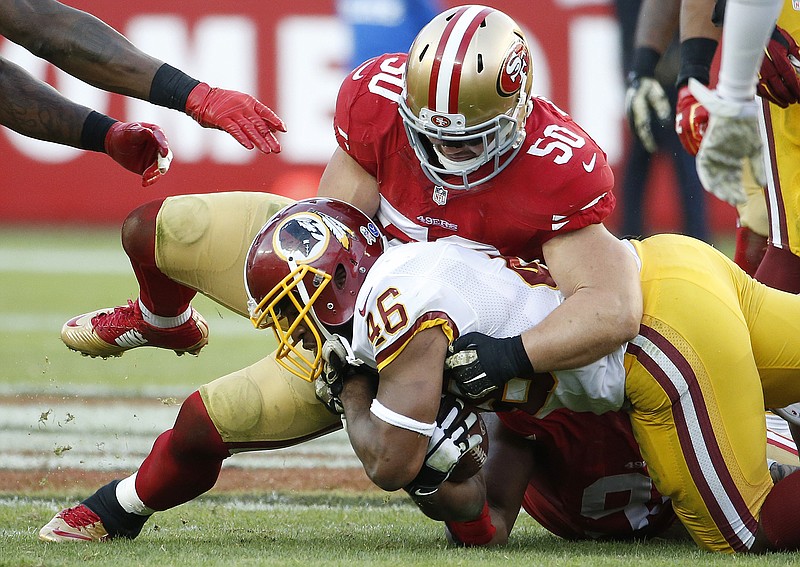Chris Borland needed two words to describe his reasons for leaving the NFL after one supremely successful season as a San Francisco 49ers linebacker.
"Brain disease," said the former Wisconsin Badger. "I didn't want to negotiate my health for money. I just thought to myself, 'What am I doing? Is this how I'm going to live my adult life, banging my head, especially with what I've learned and know about the dangers?'"
We know about the dangers of concussions more than ever before thanks in part to the sad endings of NFL lives that have gone before Borland. Mike Webster. Junior Seau. Dave Duerson. Ray Easterling. All gone too young. Their lives all ruined, at least in some part, by brain trauma caused by too many football hits to the head.
"You read all these stories," Borland told ESPN, "and to be the type of player I want to be in football, I think I'd have to take on some risks that, as a person, I don't want to take on."
The risks are huge, worse yearly.
"You look at so many of these NFL players after their careers end, and if they've had a history of concussions, their brains look different than a normal person when studied on a high-power MRI machine," saidi Dr. Bill Moore Smith, the football team physician for the University of Tennessee at Chattanooga.
"The risk of dementia and memory impairment is much higher."
Smith isn't just a doctor. He played college football at Western Kentucky University. His son, Kurt, a Baylor School graduate, was a kicker at Virginia and later, briefly, in the NFL.
"The good news is, concussions were down 25 percent this past year," Dr. Smith said. "But we've got to start teaching the right techniques from youth football forward. It's a little bit of a Catch 22, though. To protect yourself, you need to be bigger and stronger. But force equals mass times acceleration. So as you get bigger and stronger, the force of the collision increases."
Smith half-seriously offered a suggestion considered by more than one local prep coach in recent years: "Take off the helmet, or at least the facemask. I certainly think that would keep players from using their head as a weapon."
But a second later he added: "Obviously, that's not going to happen."
What Smith does see happening at the sport's highest level is a reassessment by NFL players about how long they want to play the game, given the increased risk of brain injury for every year they remain on the field.
"Guys used to want to play until they won a championship," Smith said. "Now it seems to be leaning toward, 'When can I afford to quit?'"
Wesley Walker played 13 seasons for the New York Jets. Now 59, he told ESPN.com that he suffers from spinal stenisis and nerve damage. He has 14 screws and a plate in his neck and 10 screws and two rods in his back.
"I admire (Borland) for what he did," Walker told the website. "If I had to do it over again, and I knew I'd end up in the amount of pain I'm always in, there's no way I'd play football again. With all of my injuries, including my neck, I took a chance of breaking my neck and ending up in a wheelchair. I look back and ask, 'What was I thinking?'"
In the same interview he noted, "(NFL commissioner) Roger Goodell is a good friend of mine. But I want the NFL to tell the truth about what's happening with players, and I think they sugarcoat everything."
There is no sugarcoating the potential and permanent damage of head injuries. At least there shouldn't be.
But Smith still sees more benefits than risks to football when it's played the right way.
"I think the lessons you learn from football -- teamwork, hard work, selflessness -- outweigh the risks," Smith said. "We just have to find a way to make it safer. We have to get away from using the helmet as a weapon."
Or continue to run the risk of more and more players such as Borland using their head to walk away from the game they love while they can still remember what they love about it.
Contact Mark Wiedmer at mwiedmer@timesfreepress.com.
